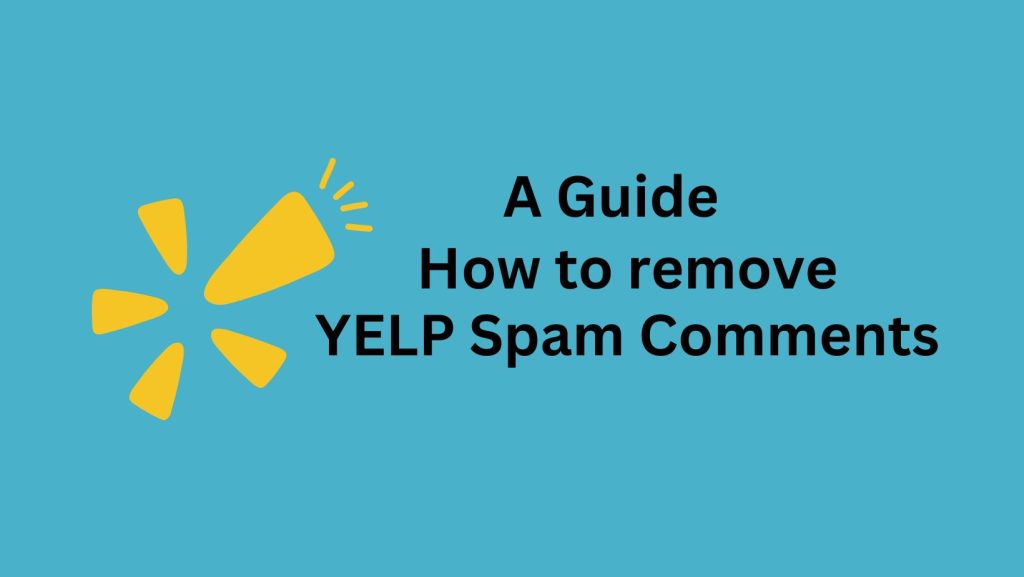The Impact of Spam Comments on Your Business Reputation
Spam comments on Yelp can have a devastating impact on a business’s online reputation. Fake reviews can lead to a loss of customer trust, ultimately resulting in potential revenue loss. According to a study, 85% of consumers trust online reviews as much as personal recommendations. Therefore, it is crucial for businesses to maintain a clean and genuine online presence. However, Yelp’s algorithm can sometimes fail to detect fake reviews, making it essential for businesses to take proactive measures to remove spam comments.
When spam comments go undetected, they can significantly harm a business’s reputation. For instance, a competitor may post fake negative reviews to discredit a business, while a business may post fake positive reviews to artificially inflate its ratings. In both cases, the business’s online reputation suffers, and customers may lose trust in the business. Furthermore, spam comments can also lead to a decrease in sales, as customers may choose to take their business elsewhere.
Businesses must be aware of the risks associated with spam comments and take steps to prevent them. This includes monitoring review activity regularly, responding to genuine reviews, and using Yelp’s built-in features to detect fake reviews. By taking these measures, businesses can protect their online reputation and maintain a healthy Yelp page. In the next section, we will discuss Yelp’s review guidelines and spam policies, which are essential for businesses to understand in order to comply with the platform’s rules and avoid account penalties.
Understanding Yelp’s Review Guidelines and Spam Policies
Yelp’s review guidelines and spam policies are in place to ensure that businesses and reviewers maintain a fair and honest online environment. Understanding these guidelines is crucial for businesses to avoid account penalties and maintain a healthy Yelp page. Yelp’s algorithm is designed to detect and filter out spam comments, but it’s not foolproof. Therefore, it’s essential for businesses to be aware of what constitutes a spam comment and how to comply with Yelp’s guidelines.
According to Yelp’s review guidelines, spam comments include fake reviews, reviews that are not based on a genuine experience, and reviews that are intended to manipulate a business’s ratings. Yelp’s algorithm uses a combination of machine learning and human moderators to detect spam comments. The algorithm looks for red flags such as repetitive language, fake profiles, and suspicious timing.
Businesses must comply with Yelp’s review guidelines to avoid account penalties. This includes not posting fake reviews, not offering incentives for reviews, and not manipulating reviews in any way. Businesses must also respond to genuine reviews in a timely and professional manner. By complying with Yelp’s guidelines, businesses can maintain a healthy Yelp page and avoid account penalties.
Yelp’s spam policies also prohibit businesses from using third-party services to post fake reviews or manipulate their ratings. Businesses must also not use Yelp’s comment management tools to remove genuine reviews. By understanding and complying with Yelp’s review guidelines and spam policies, businesses can maintain a fair and honest online environment and avoid account penalties.
In the next section, we will discuss how to identify and report spam comments on Yelp. This includes common red flags to look out for and step-by-step instructions on how to report spam comments to Yelp’s moderators. By taking proactive measures to remove spam comments, businesses can protect their online reputation and maintain a healthy Yelp page.
How to Identify and Report Spam Comments on Yelp
Identifying and reporting spam comments on Yelp is crucial for maintaining a healthy online reputation. Spam comments can harm a business’s reputation and lead to a loss of customer trust. In this section, we will provide step-by-step instructions on how to identify spam comments on Yelp and report them to Yelp’s moderators.
Common red flags to look out for when identifying spam comments on Yelp include:
- Fake profiles: Check if the reviewer has a fake or incomplete profile. Legitimate reviewers usually have a complete profile with a profile picture and a detailed description.
- Repetitive language: Check if the review contains repetitive language or phrases. Spam comments often use repetitive language to manipulate a business’s ratings.
- Suspicious timing: Check if the review was posted at a suspicious time. Spam comments are often posted in bulk or at unusual times.
- Overly positive or negative reviews: Check if the review is overly positive or negative. Legitimate reviews usually provide a balanced opinion.
To report spam comments on Yelp, follow these steps:
- Log in to your Yelp business account.
- Go to the review section of your Yelp page.
- Find the spam comment and click on the three dots next to it.
- Click on “Report Review” and select the reason why you think the review is spam.
- Provide additional information to support your claim, if necessary.
- Submit the report to Yelp’s moderators.
Yelp’s moderators will review the report and take necessary action to remove the spam comment. It’s essential to report spam comments promptly to prevent them from harming your online reputation.
In addition to reporting spam comments, businesses can also use Yelp’s comment management tools to remove spam comments. Yelp’s comment management tools allow businesses to flag comments, respond to reviewers, and manage their online reputation.
In the next section, we will discuss how to remove spam comments from your Yelp page using Yelp’s comment management tools. We will provide a step-by-step guide on how to flag comments, respond to reviewers, and use Yelp’s features to detect and remove spam comments.
Removing Spam Comments from Your Yelp Page: A Step-by-Step Guide
Removing spam comments from your Yelp page is a crucial step in maintaining a healthy online reputation. In this section, we will provide a step-by-step guide on how to remove spam comments from your Yelp page, including how to flag comments, respond to reviewers, and use Yelp’s comment management tools.
Step 1: Flagging Comments
To flag a comment on Yelp, follow these steps:
- Log in to your Yelp business account.
- Go to the review section of your Yelp page.
- Find the spam comment and click on the three dots next to it.
- Click on “Flag Review” and select the reason why you think the review is spam.
- Provide additional information to support your claim, if necessary.
Step 2: Responding to Reviewers
Responding to reviewers is an essential step in maintaining a healthy online reputation. When responding to reviewers, make sure to:
- Respond promptly to all reviews, both positive and negative.
- Be professional and courteous in your response.
- Address the reviewer’s concerns and provide a solution, if possible.
Step 3: Using Yelp’s Comment Management Tools
Yelp’s comment management tools allow businesses to manage their online reputation and remove spam comments. To use Yelp’s comment management tools, follow these steps:
- Log in to your Yelp business account.
- Go to the review section of your Yelp page.
- Click on the “Comment Management” tab.
- Use the tools to flag, respond to, and remove spam comments.
By following these steps, businesses can remove spam comments from their Yelp page and maintain a healthy online reputation. Remember to regularly monitor your Yelp page and respond to all reviews, both positive and negative, to ensure a positive online presence.
In the next section, we will discuss strategies for preventing future spam comments, including encouraging genuine reviews, monitoring review activity, and using Yelp’s built-in features to detect fake reviews.
Preventing Future Spam Comments: Strategies for Businesses
Preventing future spam comments is crucial for maintaining a healthy online reputation. In this section, we will discuss strategies for preventing future spam comments, including encouraging genuine reviews, monitoring review activity, and using Yelp’s built-in features to detect fake reviews.
Encouraging Genuine Reviews
Encouraging genuine reviews from satisfied customers is an effective way to prevent future spam comments. Businesses can encourage genuine reviews by:
- Providing excellent customer service and ensuring customer satisfaction.
- Asking satisfied customers to leave a review on Yelp.
- Responding promptly to all reviews, both positive and negative.
Monitoring Review Activity
Monitoring review activity is essential for preventing future spam comments. Businesses can monitor review activity by:
- Regularly checking Yelp for new reviews.
- Responding promptly to all reviews, both positive and negative.
- Using Yelp’s built-in features to detect fake reviews.
Using Yelp’s Built-in Features to Detect Fake Reviews
Yelp’s built-in features can help businesses detect fake reviews and prevent future spam comments. Businesses can use Yelp’s built-in features by:
- Enabling Yelp’s review filtering feature.
- Using Yelp’s review analytics to track review activity.
- Reporting suspicious reviews to Yelp’s moderators.
By implementing these strategies, businesses can prevent future spam comments and maintain a healthy online reputation. Remember to regularly monitor your Yelp page and respond to all reviews, both positive and negative, to ensure a positive online presence.
In the next section, we will discuss how Yelp’s algorithm detects spam comments and fake reviews, including the use of machine learning and human moderators. We will also discuss the limitations of Yelp’s algorithm and how businesses can work with Yelp to improve spam detection.
Yelp’s Algorithm and Spam Detection: What You Need to Know
Yelp’s algorithm plays a crucial role in detecting spam comments and fake reviews on the platform. The algorithm uses a combination of machine learning and human moderators to identify and filter out spam comments. In this section, we will explain how Yelp’s algorithm detects spam comments and fake reviews, and discuss the limitations of the algorithm.
Machine Learning
Yelp’s algorithm uses machine learning to detect spam comments and fake reviews. The algorithm analyzes a variety of factors, including the reviewer’s profile, the review’s content, and the reviewer’s behavior. The algorithm looks for patterns and anomalies that are indicative of spam comments or fake reviews.
Human Moderators
In addition to machine learning, Yelp also uses human moderators to detect spam comments and fake reviews. Human moderators review reports of spam comments and fake reviews, and make a determination as to whether the comment or review is legitimate or not.
Limitations of Yelp’s Algorithm
While Yelp’s algorithm is effective in detecting spam comments and fake reviews, it is not perfect. There are limitations to the algorithm, including:
- The algorithm can be fooled by sophisticated spam comments or fake reviews.
- The algorithm may not detect spam comments or fake reviews that are posted in bulk.
- The algorithm may not detect spam comments or fake reviews that are posted by legitimate reviewers who are trying to manipulate the system.
Working with Yelp to Improve Spam Detection
Businesses can work with Yelp to improve spam detection by:
- Reporting spam comments and fake reviews to Yelp’s moderators.
- Providing feedback to Yelp on the effectiveness of the algorithm.
- Using Yelp’s built-in features to detect and remove spam comments.
By working together, businesses and Yelp can improve spam detection and create a more trustworthy and reliable review platform.
In the next section, we will discuss the importance of managing your online reputation beyond removing spam comments, including responding to genuine reviews, using social media to engage with customers, and monitoring review activity across multiple platforms.
Managing Your Online Reputation: Beyond Removing Spam Comments
Managing your online reputation goes beyond removing spam comments from your Yelp page. It’s essential to maintain a positive online presence by responding to genuine reviews, using social media to engage with customers, and monitoring review activity across multiple platforms.
Responding to Genuine Reviews
Responding to genuine reviews is crucial for maintaining a positive online reputation. When responding to reviews, make sure to:
- Respond promptly to all reviews, both positive and negative.
- Be professional and courteous in your response.
- Address the reviewer’s concerns and provide a solution, if possible.
Using Social Media to Engage with Customers
Using social media to engage with customers is an effective way to maintain a positive online reputation. Make sure to:
- Respond promptly to all social media messages and comments.
- Be professional and courteous in your response.
- Use social media to share positive reviews and testimonials.
Monitoring Review Activity Across Multiple Platforms
Monitoring review activity across multiple platforms is essential for maintaining a positive online reputation. Make sure to:
- Monitor review activity on Yelp, Google, and other review platforms.
- Respond promptly to all reviews, both positive and negative.
- Use review management tools to streamline the review process.
By managing your online reputation beyond removing spam comments, you can maintain a positive online presence and attract more customers to your business.
In the next section, we will summarize best practices for maintaining a healthy Yelp page, including regular monitoring, responding to reviews, and using Yelp’s features to detect and remove spam comments.
Best Practices for Maintaining a Healthy Yelp Page
Maintaining a healthy Yelp page is crucial for businesses to attract and retain customers. In this section, we will summarize best practices for maintaining a healthy Yelp page, including regular monitoring, responding to reviews, and using Yelp’s features to detect and remove spam comments.
Regular Monitoring
Regular monitoring of your Yelp page is essential to ensure that it remains healthy and free of spam comments. Make sure to:
- Check your Yelp page regularly for new reviews and comments.
- Respond promptly to all reviews, both positive and negative.
- Use Yelp’s comment management tools to detect and remove spam comments.
Responding to Reviews
Responding to reviews is crucial for maintaining a positive online reputation. Make sure to:
- Respond promptly to all reviews, both positive and negative.
- Be professional and courteous in your response.
- Address the reviewer’s concerns and provide a solution, if possible.
Using Yelp’s Features to Detect and Remove Spam Comments
Yelp’s features can help businesses detect and remove spam comments from their page. Make sure to:
- Use Yelp’s comment management tools to detect and remove spam comments.
- Report spam comments to Yelp’s moderators.
- Use Yelp’s built-in features to detect fake reviews.
By following these best practices, businesses can maintain a healthy Yelp page and attract more customers to their business.
Remember, maintaining a healthy Yelp page is an ongoing process that requires regular monitoring and effort. By following these best practices, businesses can ensure that their Yelp page remains healthy and free of spam comments.







